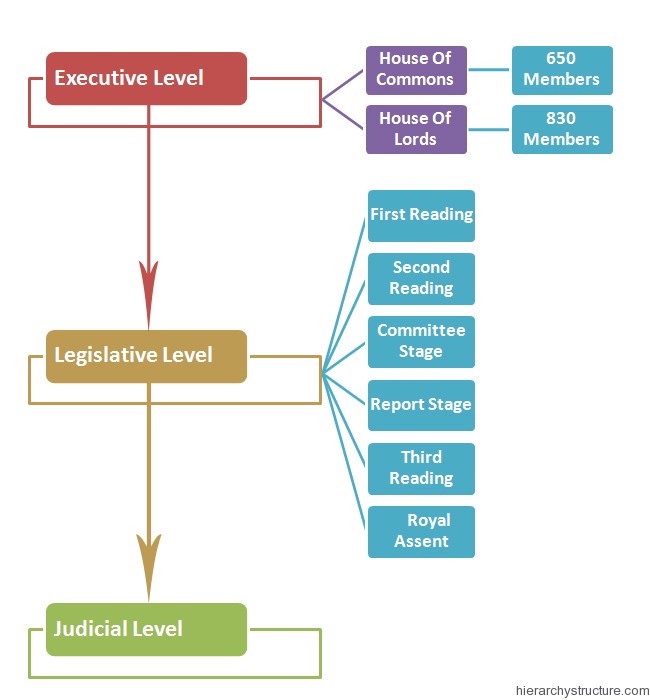The United Kingdom exercises constitutional monarchy as their political system. The most vital fact about the British political system is considered as the continuity of the system and it finds its roots in early 13th and 14th centuries from where it started to become what it is today.
The British political hierarchy has always given special status to all the three parts of United Kingdom – Northern Ireland, Scotland and Wales. All these units are separately administered by their local administrators. While England that is the largest part of UK also exercises its own political system.
Although the British political system is headed by monarch but essentially the monarch’s powers are ceremonial and the actual political system rests on three branches of horizontal political hierarchy – The Executive, Legislature and Judiciary.
Following are the vital sections of flexible and pragmatic British political hierarchy:

Executive Level
This level is comprised of the elected ministers who are responsible for running the entire country and proposing new laws.
British Parliament, which is also known as Westminster is an important segment of this level of British political hierarchy. This parliament is a bicameral body and is composed of two houses – House of Commons and the House of Lords.
The House of Commons holds the highest authority in the two houses and is the lower house. It has 650 members and is headed by the Speaker. Every member in this house hails from a different geographical constituency.
House of Lords is the upper chamber of the country but it has been given lesser authorities as compared to House of Commons. This house is majorly responsible for revising legislation and for scrutinising the activities of Government. This is quite unique political institution in the world. There is no fixed number for the members of this house and currently this house is being served by 830 members.
Legislative Level
This level lies next in the British political hierarchy and Government of the country is responsible for proposing almost all the legislation in the country. This proposed legislation is then circulated in both the above mentioned houses of parliament for approval.
Both the houses perform the bill reading process for passing it as law in the following steps:
- First Reading
- Second Reading
- Committee Stage
- Report Stage
- Third Reading
- Royal Assent
Since British political system does not have a President, so government is headed by Prime Minister. A Monarch is also there who is the hereditary member of the British Royal family but tey possess very few political powers.
Judicial Level
This is the most complex section of British politics. British political system recognizes three legal systems – One for Scotland, One for Northern Ireland and one for Wales & England.
Although these systems are quite similar in terms of principles followed but they differ in the way they operate. The major job of the judicial system is to ensure that everyone is obeying law and all the activities that are happening in the country are legal.
